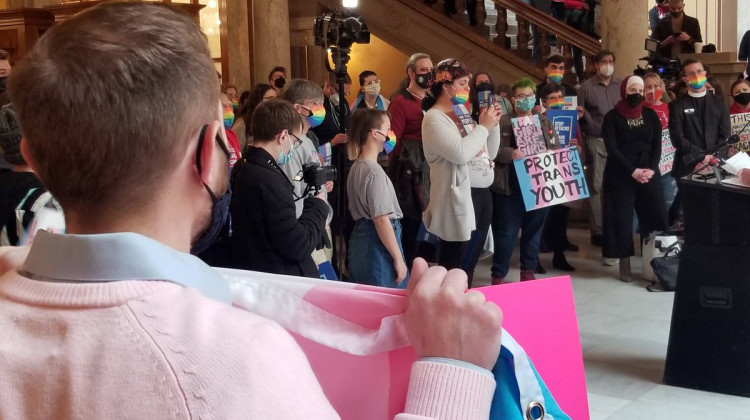
Controversial bills aligned with national political battles on cultural and social issues in schools dominated conversations at the Statehouse this session.
(Jeanie Lindsay/IPB News)It is impossible to talk about this year's legislative session without first discussing the school curriculum bills – House Bill 1134 and Senate Bill 167 – and the bill banning transgender girls in girls school sports, House Enrolled Act 1041.
Hundreds of Hoosiers converged at the Statehouse to protest them throughout session.
Zoe O'Haillin-Berne is one of several people who urged Hoosiers to support transgender children as lawmakers considered the school sports bill.
"We are asking Hoosiers across the state to step forward and help these children, to love them, to support them, to advocate for them – because they need us now more than ever," she said.
Ultimately, the curriculum bills both died and lawmakers sent the transgender girls athlete bill to the governor.
Those got most of the attention, but lawmakers worked on other changes too.
Some proposals focused on mitigating the impact of the pandemic. One measure, Senate Enrolled Act 2, lets schools avoid funding losses after getting hit hard by COVID-19 last semester. It's already been signed by Gov. Eric Holcomb.
Senate Education and Career Development Committee Chair Jeff Raatz (R-Centerville) said it gives schools a work-around for calculating quarantined students' enrollment, since Indiana offers schools less funding for virtual students.
"Because of the existing law, school districts potentially could lose 15 percent of the foundation amount," he said.
As part of House Enrolled Act 1093, lawmakers also – once again – approved a measure allowing schools to avoid lower state accountability grades.
Lawmakers made several new rules for schools too: about school board meetings, e-learning days and who schools can hire to teach.
School boards are now required to hear public comments at meetings, per House Enrolled Act 1130. Lawmakers also approved Senate Enrolled Act 83, making it so boards have to hear comments on action items before voting on them. Both bills have also been signed by Holcomb.
House Education Committee Chair Bob Behning (R-Indianapolis) said the two bills will make school board meetings operate more similar to how things work in the Statehouse.
"So this just changes it more so that it reflects what we do in this body," he said.
But the General Assembly didn't take that approach as it added a limit to the number of virtual instruction, or e-learning, days schools can use each year. Lawmakers added the three-day cap to virtual instruction into HEA 1093 without hearing public comment first.
The change includes options for schools to work around the cap, but Democrats pushed back on the idea during a conference committee meeting, including teacher Rep. Tonya Pfaff (D-Terre Haute).
Pfaff said the three-day limit is too restrictive – because schools use e-learning days when teachers are busy with things like proctoring state-required assessments.
"That, in addition to snow days – I just think three is pretty restrictive," she said.
Join the conversation and sign up for the Indiana Two-Way. Text "Indiana" to 73224. Your comments and questions in response to our weekly text help us find the answers you need on statewide issues. Trying to follow along with our coverage of the legislative session? We've compiled all the stories our reporters have published by bill number and topic here.
To combat teacher shortages, lawmakers are allowing schools to hire people with specific professional expertise, called adjunct teachers, as part of House Enrolled Act 1251.
But Rep. Vernon Smith (D-Gary) worries the adjunct option is a step away from finding qualified, well-rounded teachers. And doesn't address why schools struggle to keep them.
"What this bill is offering us is a body in the classroom, not someone who is prepared to deal with children," Smith said.
So what did lawmakers do to more directly affect Hoosier children?
They tightened up dyslexia screening rules with Senate Enrolled Act 123, and created a one-time grant program to help families with education costs – paid for by pandemic relief funding – also as part of HB 1251.
Sen. Jean Leising (R-Oldenburg) also still wants more students to file the Free Application for Federal Student Aid, or FAFSA. She proposed Senate Bill 82 to require that students fill out the form – but settled for a version requiring the state to give families more information and very specific notice about it.
"This is a little bit positive forward movement in the fact that most of our kids then and their parents will know that FAFSA exist," she said.
The General Assembly also made some behind the scenes changes.
Part of HEA 1251 says the Indiana Department of Education and state board will reduce the number of state standards and work to align tests, like ILEARN, with those.
Another bill that passed, Senate Enrolled Act 331, will have Indiana take a closer look at teacher compensation and salaries, in addition to fine-tuning some of the language around the new education scholarship account program lawmakers approved last session.
In a sign of what could be coming in future sessions, lawmakers also included language in HEA 1251 for the department to investigate and make recommendations on what a new program could look like for teachers and parents working together directly. Specifically, the bill outlines questions about what it would take to create a teacher-parent compact program – supported with state funds and teacher retirement benefits.
But plenty of other ideas this session didn't pass – like a school referendum sharing proposal, a rework of special education disputes, and a bill to make school board races partisan.
Another proposal that would have removed a legal defense for K-12 schools and libraries accused of sharing harmful material with children also failed.
The original bills that language was part of, Senate Bill 17 and HB 1134, died in the second half of session. The proposal was later added into House Bill 1369 and again passed the House, but lawmakers in the Senate rejected HB 1369 as its final act before adjournment.
It's not certain they'll return, but there's always a chance of similar ideas making a comeback at the Statehouse next year.
Contact reporter Jeanie at jlindsa@iu.edu or follow her on Twitter at @jeanjeanielindz.
9(MDAyMzk1MzA4MDE2MjY3OTY1MjM5ZDJjYQ000))
 DONATE
DONATE



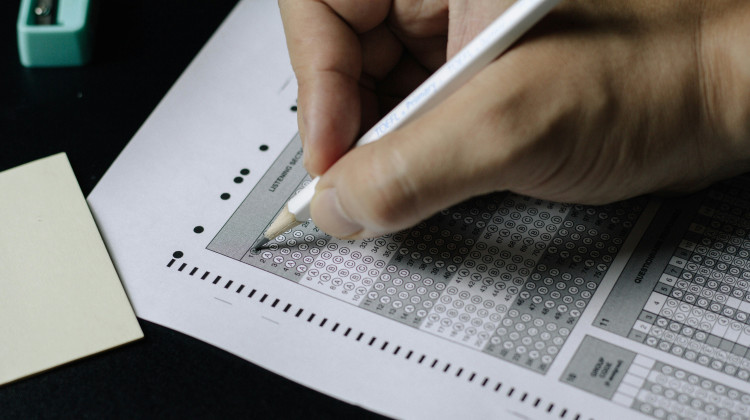
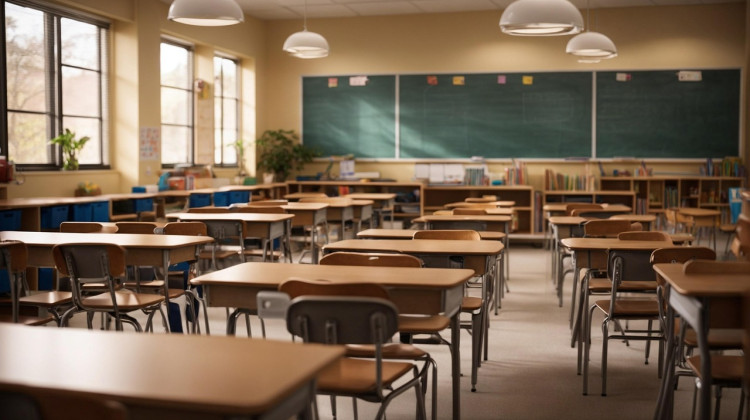
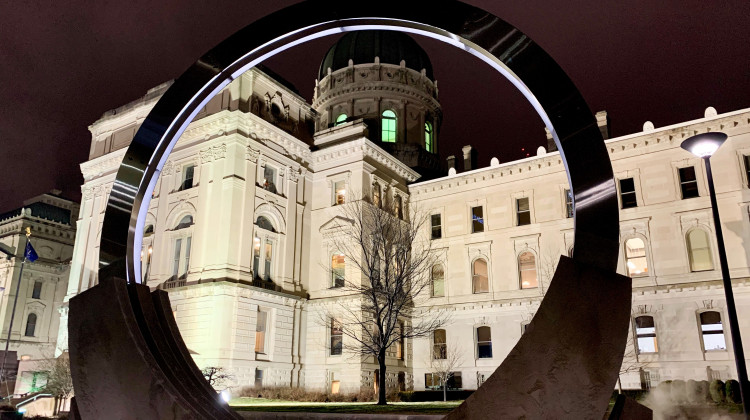
 View More Articles
View More Articles

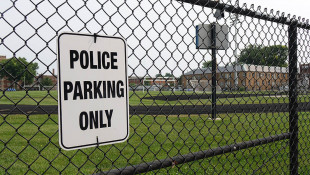

 Support WFYI. We can't do it without you.
Support WFYI. We can't do it without you.